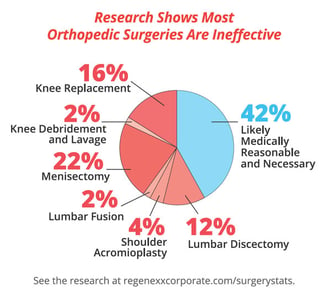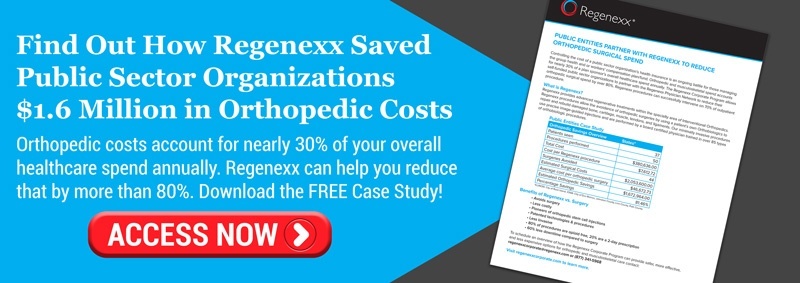National Insurance Services has partnered with Regenexx to help our self-funded, public sector employers with 100+ employees or more, reduce healthcare costs, improve outcomes, and deliver better satisfaction to their employees for orthopedic care.
Employers are always looking for ways to reduce their healthcare spend. Health plan add-ons are additional services you can offer your employees that drastically improve retention and lower medical claims spending all at the same time. You can incorporate these solutions into your health plan design.
Orthopedics & Regenexx
Orthopedics is the branch of medicine dealing with the correction or prevention of disorders of the bones and associated joints and muscles. This includes conditions like slipped discs, carpal tunnel syndrome, rotator cuff tears, hip joint replacements, ACL tears, or plantar fasciitis.
Orthopedics comprises almost one-third of all health care expenditures at a cost approaching $510 billion or 5% of Gross Domestic Product.1 Orthopedic costs remain as one of the fastest areas of spend at 20-40% of an employer’s overall costs.2
Surgery is a common option for treatment of these conditions, but it can be invasive and expensive. Recovery periods may be long. It might involve a hospital stay, pain medication, physical therapy, and time off work. On top of that, studies show that over 50% of orthopedic surgeries have been shown to be ineffective or unnecessary in clinical trials.3

Regenexx is helping employers reduce their orthopedic claims by providing employees with lower cost procedures. It uses regenerative medicine and stem cell science to heal orthopedic injuries, treat arthritis, and repair degenerative conditions.4 The non-surgical procedure uses patients’ adult blood platelets or stem cells to initiate healing of damaged tissues, ligaments, cartilage, bone, spinal disc, or tendons.4 The needle-based injections are applied precisely to the correct area of the body so that tissue will grow and build a stronger musculoskeletal structure. These techniques are less expensive, minimally invasive, and take advantage of the body’s ability to heal itself.
Results
Some advantages to interventional orthopedic treatments include:
- Less invasive and therefore less painful
- Better patient outcomes
- Less need for addictive pain medication
- 80% plus average of reduction in orthopedic healthcare costs4
- Less time away from work and lifestyle
- 95% of patients avoid surgery4
- Reduced post procedures protocol and reduced recovery time by 60%4
- Effective for over 70% of elective insurance covered orthopedic surgeries4
For those employers who added additional orthopedic treatment options, Regenexx has found that 99.7% of employees will choose Interventional Orthopedic treatment over surgery, and for the employer, the cost savings can reach upwards of 84% -- not including savings from decreased time off and increased employee retention.2
| Employer Savings on 180 Regenexx Procedures2 | |
| Est. orthopedic surgery & patient cost | $5,600,166 |
| Regenexx alternative & patient cost | $910,755 |
| Total cost savings | $4,689,411 |
| Savings rate | 84% |
For more information on Regenexx or for more ways to reduce your healthcare spend, contact your NIS Employee Benefits Consultant.
Resources
1 http://www.mdedge.com/amjorthopedics/article/104890/practice-management/orthopedics-us-health-care
2 Centeno, Chris and Hellickson, Jason. Regenexx. (2017) Innovative Employers Capitalize on Disruptive Orthopedic Strategy. Des Moines, IA.
3 https://tradingeconomics.com/united-states/corporate-profits
4 Reducing Orthopedic Costs for Self-Funded and Self-Insured Employers. Regenexx, 2017.

